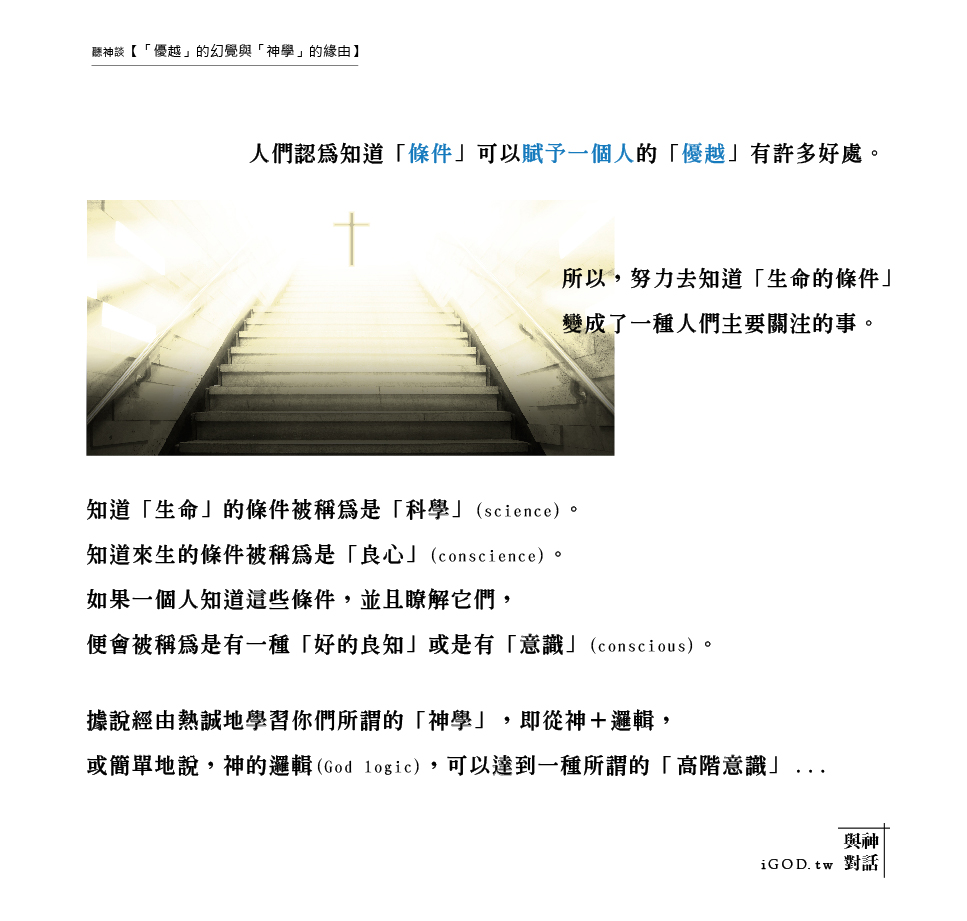
聽神談【「優越」的幻覺與「神學」的緣由】
「優越」是存在的觀念源自:人們認為,如果「有條件」是存在的,那麼要享受與創造一個人渴望的人生及來生,他們就必須要知道那些條件。。
這樣的結論難免會像這樣:那些知道條件的人比不知道的人「較為優越」。
然後,沒有多久,人類便從這一句結論中把「較為」兩個字移除掉。
故此,「優越」的觀念便誕生了。
優越有許多用處。其中最主要的一個是,提供了可以去做「為確保能得到足夠的一切——包括神的愛——所須做的事」之無須爭辨的正當理由。知道條件可以賦予一個人權利去忽視他人、去叫人皈依,或乾脆消滅那些不知道條件或不同意他們的人。
所以,努力去知道「生命的條件」變成了一種主要的當務之急的事。知道「生命」的條件被稱為是「科學」(science)。知道來生的條件被稱為是「良心」(conscience)。如果一個人知道這些條件,並且瞭解它們,會便被稱為是有一種「好的良知」或是有「意識」(conscious)。
據說經由熱誠地學習你們所謂的「神學」,即從神+邏輯,或不嚴謹地說,神的邏輯(God logic),可以達到一種「高階意識」。
摘自《與神合一》第9章
SUPERIORITY EXISTS
Humans concluded that if Conditionality existed, then knowing the conditions would be necessary to enjoy and create the life—and the afterlife—that one desired.
This conclusion was unavoidable, as was: Those who knew the conditions were better off than those who did not.
And it did not take much time for the human race to remove the word “off” from the previous sentence.
Thus the idea of Superiority was born.
Superiority had many uses. Chief among them was providing inarguable justification for doing whatever was needed in order to guarantee that “enough” of everything—including God’s love—was available. Knowing the conditions gave one the right to ignore others, or seek to convert others, or simply eliminate others who did not know the conditions, or agree to them.
Therefore, seeking to know the conditions of Life became a major preoccupation. Knowing the conditions of Life was called science. Knowing the conditions of the afterlife was called conscience. If one knew these conditions and understood them, one was said to have “a good conscience,” or to be “conscious”.
A “high consciousness” was said to result from the earnest study of something you called theology, from theology, or, loosely, God logic.

